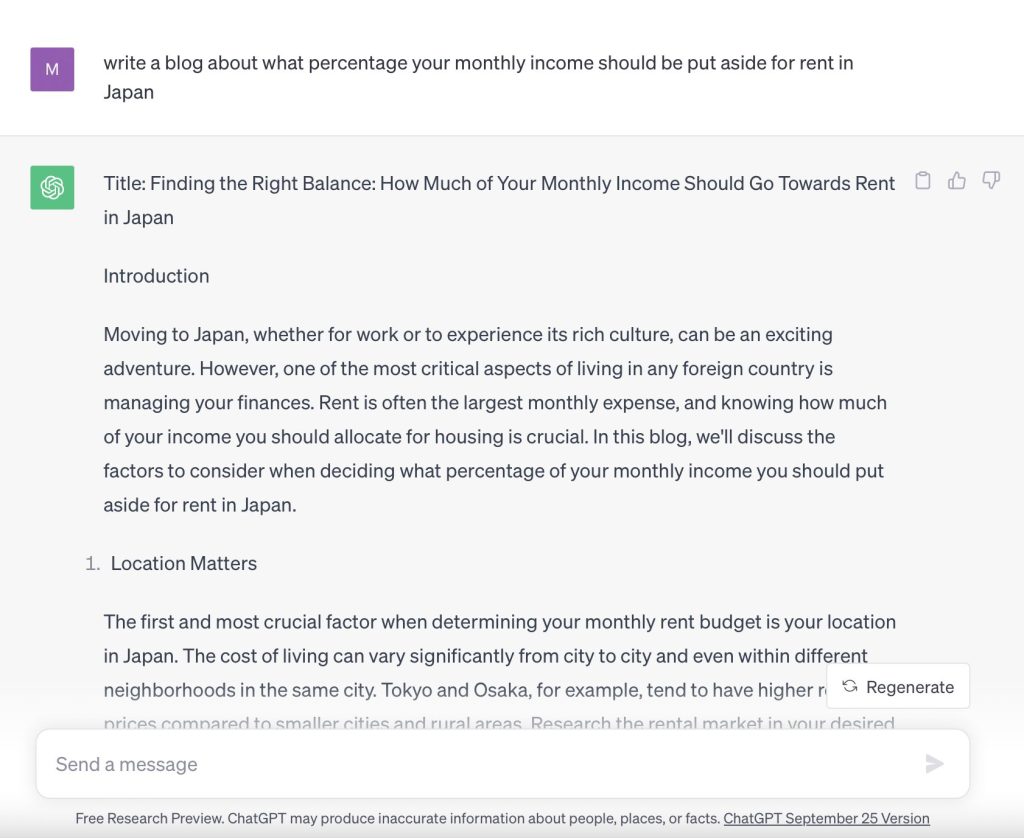
Moving to Japan, whether for work or to experience its rich culture, can be an exciting adventure. However, one of the most critical aspects of living in any foreign country is managing your finances. Rent is often the largest monthly expense, and knowing how much of your income you should allocate for housing is crucial. In this blog, we’ll discuss the factors to consider when deciding what percentage of your monthly income you should put aside for rent in Japan.
Location Matters
The first and most crucial factor when determining your monthly rent budget is your location in Japan. The cost of living can vary significantly from city to city and even within different neighborhoods in the same city. Tokyo and Osaka, for example, tend to have higher rent prices compared to smaller cities and rural areas. Research the rental market in your desired location and compare the average rent prices to your budget.
Your Monthly Income
Your monthly income is a major determinant of how much you can afford to allocate for rent. It’s generally recommended that you don’t spend more than 30% of your monthly income on rent. This is a common rule of thumb in many countries, including Japan. Calculate your net income (after taxes) and make sure you can comfortably allocate around 30% for housing.
The 3x Rule
Another rule of thumb to consider is the 3x rule, which suggests that your annual salary should be at least three times your annual rent. For example, if your annual income is ¥4,800,000, your annual rent should ideally not exceed ¥1,600,000, or ¥133,333 per month. Adhering to this rule can help you maintain a healthy balance between your income and your housing costs.
Lifestyle and Expenses
Your personal lifestyle and monthly expenses play a significant role in determining the percentage of income you can allocate to rent. Consider factors such as transportation, utilities, groceries, and leisure activities. Be sure to budget for these expenses alongside your rent to ensure you maintain a comfortable standard of living.
Initial Costs
In Japan, it’s not uncommon for landlords to require substantial upfront costs, including security deposits, key money (reikin), and agency fees. These initial costs can significantly impact your budget. Ensure you have enough savings to cover these expenses without straining your finances.
Shared Housing Options
If you’re concerned about the cost of rent in Japan, consider shared housing options like guesthouses, share houses, or apartment shares. These arrangements can be more affordable, allowing you to allocate a smaller percentage of your income to rent while still enjoying a comfortable living space.
Consider Income Variability
If your income is variable or relies on commissions or freelance work, it’s essential to have a safety net or emergency fund. This will provide financial security during months with lower income, helping you cover your rent without compromising other essential expenses.
Conclusion
Deciding how much of your monthly income to put aside for rent in Japan is a crucial part of maintaining a stable financial situation during your stay. Be sure to research the local rental market, calculate your income, and consider your expenses and lifestyle when making this decision. By following these guidelines, you can strike a balance that ensures you enjoy your time in Japan without financial stress. Remember that while these guidelines can be helpful, your personal circumstances and preferences should ultimately guide your budgeting decisions.

For additional information or any questions please contact us here
Email: info@remax-apex.com

